
Related
Topics
Widespread violence continues across Iraq, particularly in Sunni areas of the county, as three days of bloody attacks left more than 80 people dead. Eleven U.S. troops have also been killed since Friday. We go to Baghdad to speak with independent reporter Dahr Jamail. [includes rush transcript]
Widespread violence continues across Iraq, particularly in Sunni areas of the county, as three days of bloody attacks left more than 80 people dead.
The cities of Tikrit, Baji and Latifiya all saw violence with the Iraqi resistance mainly targeting Iraqi security forces and civilians working with the US military. Fears of the outbreak of all-out civil war in Iraq were heightened as fighting in the town of Latifiya, south of Baghdad, saw the first set-piece battle between Shiite and Sunni militiamen since the fall of Saddam Hussein. This according to the Washington Post.
Mosul was the site of one of the weekend’s bloodiest attacks when a suicide bomber targeted a bus carrying Kurdish peshmerga fighters, killing 16 people.
Eleven U.S. troops have also been killed since Friday.
Meanwhile, unrest continues in Fallujah despite US claims last week of a military success in retaking the city. US marines still face an up-close, urban battle and continue to take casualties. The only aid agency in Fallujah–the Iraqi Red Crescent Society–withdrew from the town Sunday. The Boston globe is reporting the US military is closely monitoring the movement of all the city’s residents, creating what looks like a police state. So-called “citizen processing centers” have been set up where the US military takes DNA samples of residents and makes scans of their retinas. In addition residents are given ID badges that must be worn at all times.
- Dahr Jamail, an independent journalist currently based in Baghdad. He is one of the only independent, unembedded journalists in Iraq right now. He publishes his reports on a blog called DahrJamailIraq.com.
Transcript
AMY GOODMAN: Dahr Jamail is with us now, an independent journalist currently based in Baghdad and one of the only independent, un-embedded journalists in Iraq right now. He publishes his reports on a blog called dahrjamailiraq.com. It good to have you with us. Can you talk about the latest, what has happened this weekend?
DAHR JAMAIL: Well, it has been, as you reported, a very bloody and chaotic weekend here. Amidst the backdrop of a horrendous gas crisis, the first I have seen eve the last your. We have lines at the pumps, seven and eight miles long. Baghdad is basically running on generators. This is also driving the cost of everything up including food and basic necessities. With the rising fuel cost it has become almost impossible to find gasoline even on the black market. So as its winter here and people rely on kerosene and gasoline to heat their homes even generators are now running out of fuel. It is a desperate situation here.
AMY GOODMAN: You wrote a piece called “Trophy Hunting.” Tell us what you meant.
DAHR JAMAIL: I’m sorry, I couldn’t hear that.
AMY GOODMAN: You wrote piece called “Trophy Hunting.” What do you mean?
DAHR JAMAIL: Well, I wrote it in response to the new photos that have been released of Navy Seals basically taking trophy pictures with prisoners who had been beaten and possibly tortured and they were referred to as trophy pictures. And this is very similar to reports I have had from refugees I continue to interview coming from outside of Fallujah who have stated that U.S. tanks, U.S. soldiers rather, have taken the dead bodies of fighters, tied their hands behind their backs and lashed them to the tanks and were driving around the city of Fallujah with them during ongoing military operations displaying the dead bodies of the fighters as trophies and used obviously as some sort of sick psychological warfare against the resistance, who are there continuing to fight them.
AMY GOODMAN: Meanwhile, Fallujah, can you talk about what has been set up there, the kind of personnel control center where people are having their D.N.A. taken, retina scans. Are you getting word of this in Baghdad?
DAHR JAMAIL: We are. It is very creepy news, and it is almost unbelievable, but I guess not quite unbelievable here in Iraq these days. They have also mentioned that they are going to try to establish work brigades of Fallujahn men wearing identifying arm bands. They will set into work brigades as the military is calling them, in order to go about clearing rubble and taking part in reconstruction of their own city. They feel that this is what is going to have to be done to keep resistance fighters from out of the city while putting citizens to work in rebuilding their own city. One reason they are having to do this is that while the military has been attempting to establish some sort of reconstruction in Fallujah they can’t keep Iraqi contractors there because most are too afraid. They are receiving daily death threats from the resistance who are still operating very heavily in the area. So any time people even sign a contract to complete work, or to begin work in Fallujah, most days they are simply not even showing up. So this is another reason, aside from ongoing sometimes fierce fighting in Fallujah that there basically no reconstruction occurring there at all.
AMY GOODMAN: What about the Iraqi Red Crescent? At the command of the U.S. military, pulling out of Fallujah for a few days? Why are they doing that?
DAHR JAMAIL: They were instructed by the military to leave because the military said they were going to have to “comb the area” around the building where the Iraqi Red Crescent was operating, an obvious sign that there’s ongoing fighting in Fallujah. It is extremely unstable, definitely not secured by any stretch of the imagination. So the I.R.C. was instructed to leave. So they left all of their supplies there, medicine, food and medical equipment, which they estimate was enough for roughly two or three days to help the people still stranded in the city. And they have left and have not been given word or any idea of when they will be allowed back inside the city.
AMY GOODMAN: Finally, in another piece you write about the quiet of destruction and death. Describe it.
DAHR JAMAIL: Well, I interviewed a woman who went in with a previous Red Crescent, small convoy of three ambulances that got in their last Sunday week ago and she described a horrendous scene inside of Fallujah to me. She said that it was very quiet there, but it wasn’t the quiet of peace. It was the quiet of death and destruction. She said that virtually every building, mosque, school and house that she saw was either completely destroyed or very heavily damaged. She said that people were still going about, when they could get out, which was rare, but they were going about bearing body parts of family members that they found blown apart by bombs. Other times they were bearing skeletons of bodies because the rest of the body had been eaten by dogs. She described families there who were existing by, for example, one family was taking rice, putting it in a bowl of dirty water because there’s no running water in Fallujah and hasn’t been for over month, putting the rice in a bowl of dirty water, letting it sit one or two hours and eating it. So of course everyone has diarrhea and intestinal problems. There’s no electricity, no fuel for stoves. It is just a horrendous situation there. And while small amounts of aid has gotten that the city, the families who are there are definitely suffering, they are all completely traumatized and really waiting for something to change with very little hope in sight.
AMY GOODMAN: Dahr Jamail, I want to thank you for being with us in Baghdad. He is one of the only independent, un-embedded journalists in Iraq right now. You can read his blog at dahrjamailiraq.com.

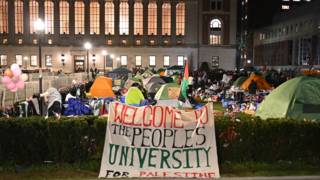
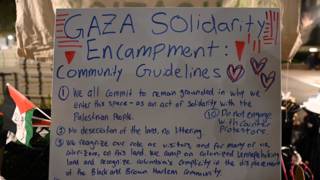
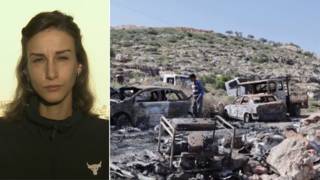
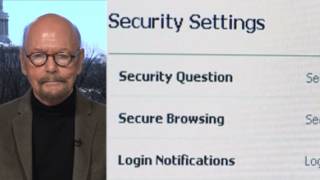





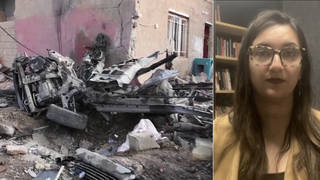

Media Options